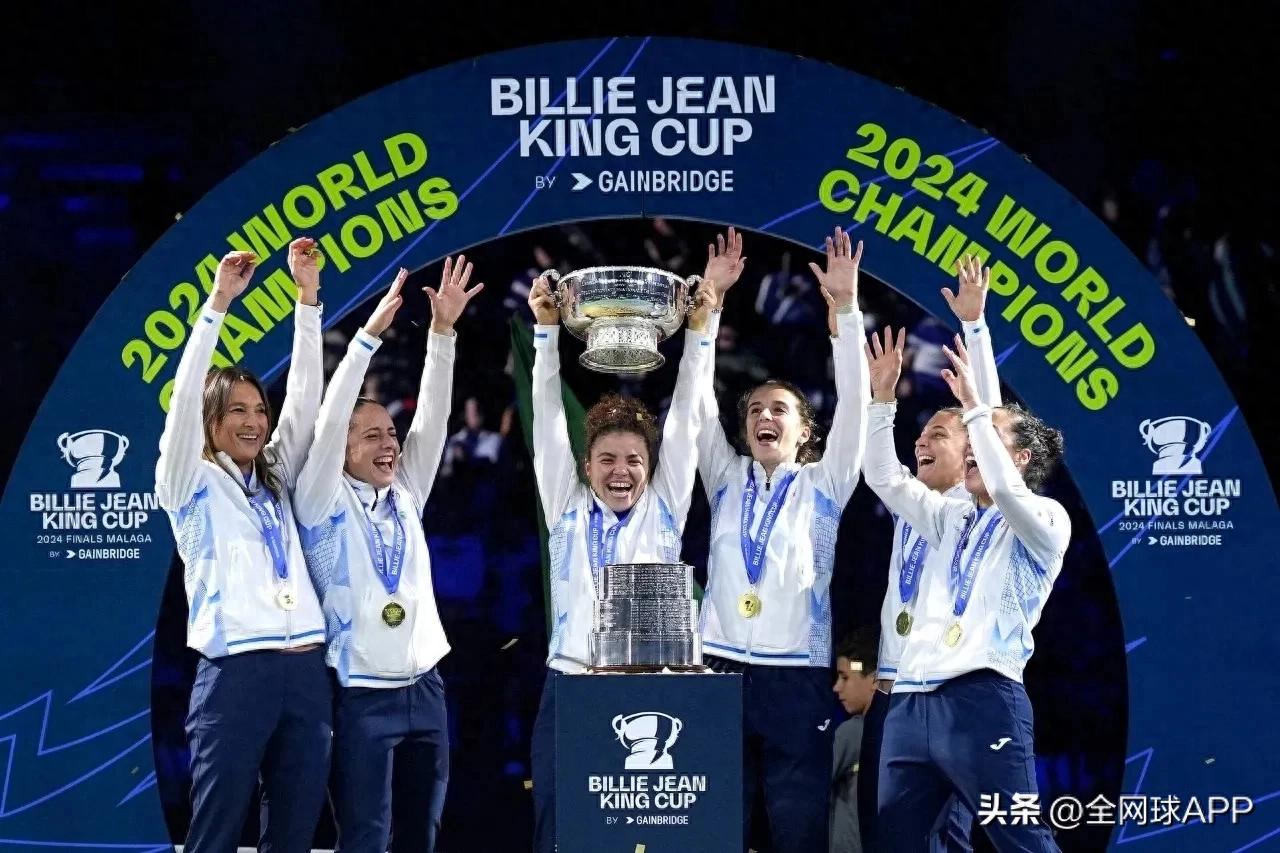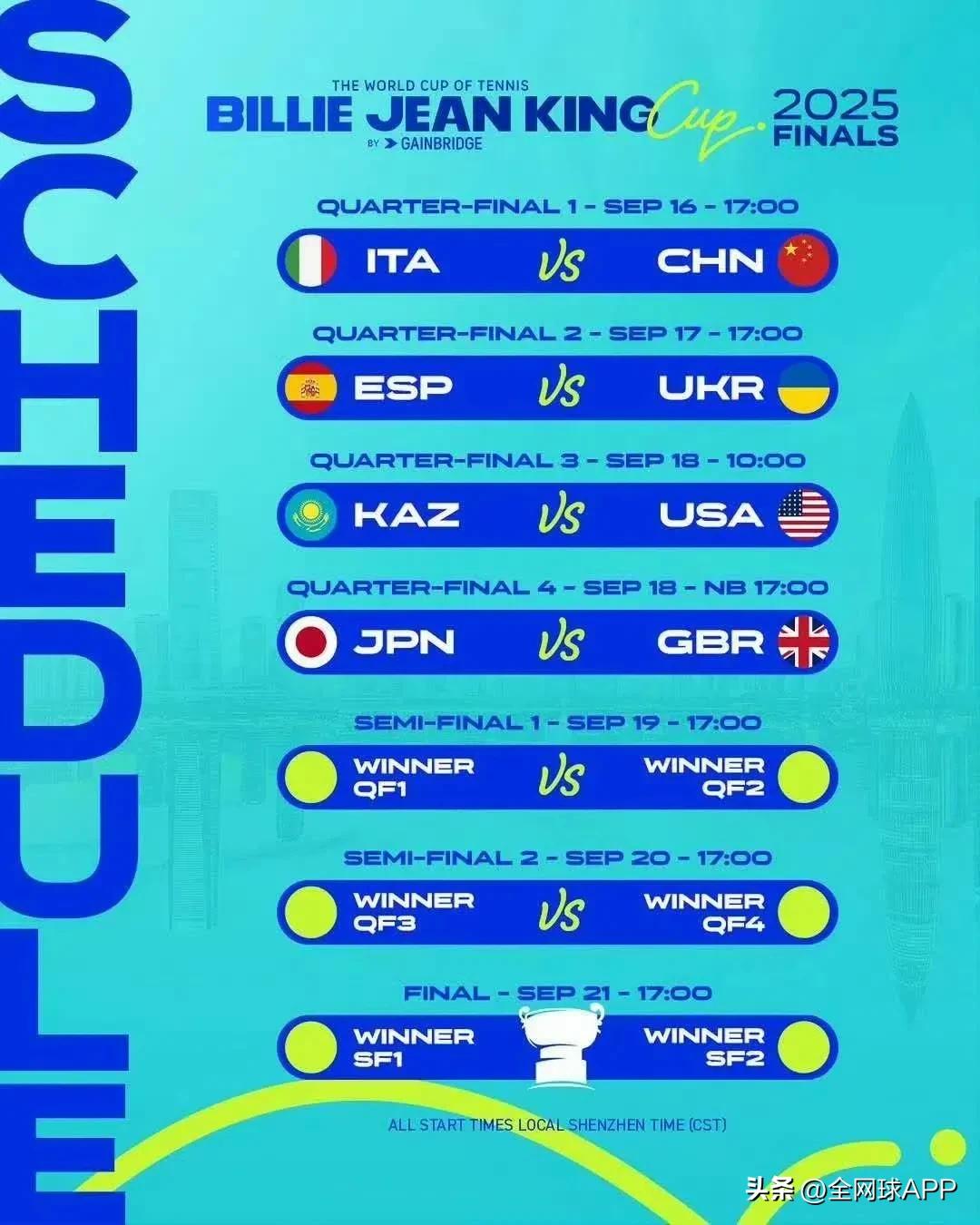Billie Jane King Cup: The glorious history of women's team tennis
In the long history of the development of women's tennis in the world, the Billie Jean King Cup (Billie Jean King Cup) is an important carrier carrying the spirit of hard work, breakthrough and equality. From the establishment of the tournament more than half a century ago, which began to take shape, to the gradual growth of the benchmark of the women's tennis team competition, it has written a glorious chapter for female tennis players step by step.

2024 Billy Jean King Cup Champions Italy (Photo: Official Social Media)
Origin of the event: The dream of the women's tennis team set sail
In the 60s of the 20th century, women's individual tennis competitions flourished, but there was a lack of large-scale team events that could truly unite national honors and show team strength. In 1963, on the occasion of its 50th anniversary, the International Tennis Federation (ITF) filled this gap with the creation of the Federation Cup, the predecessor of the Billie Jean King Cup.
The inaugural Confederations Cup was held in London, England, where 16 teams from all over the world gathered to kick off the women's team tennis event. The U.S. team lifted the trophy at the inaugural event, and one of the team's members, Billie Jean King, will go on to be a key figure in advancing equality in women's tennis and women's sport as a whole. In the initial stage, the conditions of the tournament were far less favorable than today, due to the lack of bonus support, the participating teams needed to bear their own participation fees, but the sense of mission for the development of women's tennis and the pursuit of national honor attracted players from all over the world to actively participate, and the players were deeply aware that this is an important platform for women's tennis to strive for more attention and development space.
Growth and transformation: development and growth in exploration
With the popularity of women's tennis, more national and regional teams are eager to participate in the Confederations Cup. In 1992, due to the significant increase in the number of participating teams, the tournament began to set up regional qualifiers, through the classification of teams to find a competitive stage, which also made the competition system of the tournament more reasonable.
In 1995, the Billie Jean King Cup followed the example of the Davis Cup in men's team tennis with a home-and-away system and a best-of-five format (4 singles + 1 doubles). This change allowed the women's players to return to their hometowns and fight for the honor of their country with the support of local fans and spectators, which greatly increased the attention and appeal of the tournament, and also accelerated the expansion of the tournament to become a team event with a wide coverage in the field of women's tennis.
Since 2020, the Billie Jean King Cup has created a Grand Final format, an event that continues to innovate the format while exploring. The 2025 Billie Jean King Cup Shenzhen Finals will be contested by eight teams, with the host team China and defending champions Italy advancing directly to the finals, while the remaining six finalists will be determined by the qualifying rounds. The format of the quarterfinals is on par with the Davis Cup format of the men's team tennis tournament, which further practices gender equality and makes the tennis World Cup more closely integrated.
Glory renamed: Cast a monument of equality in the name of legend
In 2020, the International Tennis Federation (ITF) made the historic decision to rename the Confederations Cup to the Billie Jean King Cup, in recognition of Billie Jean King's contribution to the development of women's tennis. This initiative makes the event the first major team sporting event in the world to be named after a woman, and has strong symbolic significance. At the same time, the tournament prize money will be increased in the same way as the men's Davis Cup, practicing gender equality at the economic level, and conveying to the world that women's tennis is as important as men's tennis.

Billie Jean King (Photo: Official Social Media)
Billie Jean King is a key enabler in the development of women's tennis. In her 22-year career, Billie Jean King has won 12 Grand Slam singles titles, including six Wimbledons, four US Opens, one French Open and one Australian Open, as well as 16 Grand Slam Women's Doubles and 11 Grand Slam Mixed Doubles titles.
Off the court, Billie Jean King led the founding of the Women's Tennis Association (WTA) in 1973 to advocate for the rights of female players, promote equal pay for men and women at the U.S. Open, and break down the long-standing gender pay barriers in sports. Billie Jean King's influence continues to extend beyond the court, becoming the first female athlete to receive the U.S. President's Medal of Freedom, named after her by the National Tennis Center.
In the Confederations Cup, Billie Jean King has lifted the championship trophy 11 times (7 times as a player and 4 times as a team leader), deeply involved in and shaped the spiritual core of the event.
From 2025 to 2027, the Billie Jean King Cup Finals will be held in Shenzhen, the world-renowned national women's tennis team event Finals will be held in Asia for the first time. From September 16 to 21, this year's Billy Jane King Cup Finals will be held at the Shenzhen Bay Sports Center Gymnasium, where the 2019 WTA Finals were held.

2025 Billy Jane King Cup Shenzhen Finals schedule
According to the draw and schedule, at 5 p.m. on September 16, 2025, the host Chinese team will play the defending champion Italy in the opening match of this year's Billie Jean King Cup Finals. After that, Spain will compete with Ukraine, Kazakhstan and the United States, and Japan and Great Britain for a ticket to the semi-finals, with the semi-finals and finals taking place over the weekend. All matches in the Grand Final consist of three matches – two singles and one doubles, all of which are played in a best-of-three format (including a tie-break).







 Links
Links
 Contact
Contact
 App
App


